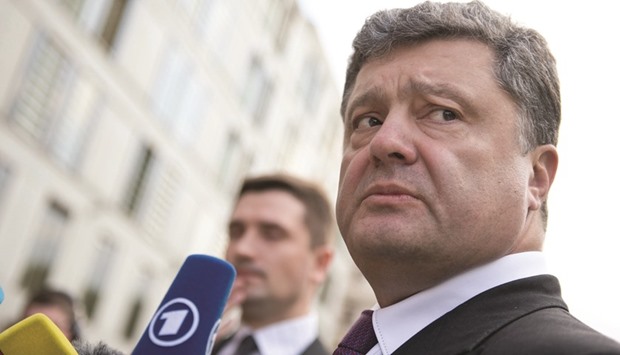Ukrainian President Petro Poroshenko has asked Prime Minister Arseniy Yatseniuk to resign in the face of lost public trust in his ability to fight corruption and overcome a deep economic malaise.
Poroshenko’s dramatic intervention came as opinion polls showed growing public disenchantment with the pro-Western team that took over the leadership of the former Soviet nation after the 2014 revolt.
Yesterday parliament held a vote of no confidence in the government after first listening to Yatseniuk account for his 2015 performance and plans for this year.
A stony-faced Yatseniuk arrived in the chamber just moments after the president’s statement was released.
“We will accept any decision of this parliament,” Yatseniuk said in his opening remarks. “But regardless what is decided, I ask parliament, the president and the responsible political classes to move further along the path of reforms.”
Shortly before the vote, the premier emphasised: “We saved this country and I want you to respect that.”
“Dear deputies: we now have a country with full state coffers, an armed Ukrainian army, written-off debts, and paid salaries and pensions,” Yatseniuk said.
“We will hand over the country to a new government with honour and dignity,” he concluded.
Poroshenko himself said the current cabinet had made some early progress but had since lost voters’ confidence.
“It is not clear that successful reforms can only be conducted by a government that enjoys sufficiently high public support?” Poroshenko said in a statement. “In order to restore trust, therapy is no longer enough – you need surgery.”
The vote failed, however.
The motion to oust the pro-Western government leader collected only 194 of a required 226 votes in Ukraine’s 450-seat parliament.
Any Yatseniuk resignation must still be approved by parliament – a step that is likely considering the level of lawmakers’ dissatisfaction with the current cabinet.
But the government’s collapse could jeopardise the delivery of a massive International Monetary Fund (IMF)-led rescue package aimed at reviving Ukraine’s shattered economy and putting it on a course toward sustainable growth.
Poroshenko has the option of calling early elections should lawmakers fail to come up with Yatseniuk’s replacement within two months.
But the presidency said that Poroshenko would consider holding early polls “only as a last resort”.
Yatseniuk was a passionate foe of Russia who endeared himself to the West by promoting belt-tightening measures that were promised but ignored by a succession of preceding leaders.
However, the 41-year-old former banker’s promises to clean up the government by cutting its ties to tycoons soon fell flat with voters who accused him of backing the interests of the very billionaires he had vowed to sideline.
Recent opinion polls show 70% of Ukrainians supporting Yatseniuk’s ouster and only 1% backing his People’s Front parliamentary bloc.
“People expected real and quick changes from Yatseniuk, and they did not come,” political analyst Mykola Davydyuk told AFP.
And presidential party member Yuriy Lutsenko accused the government “of stopping its work in September or October and ever since only been trying to save itself” from a major overhaul.
Poroshenko’s statement also sought the resignation of Prosecutor General Viktor Shokin – a public hate figure who was widely accused of covering up corruption within his own agency.
Shokin was dealt a blow when a raid on the homes of two high-ranking prosecutors in July found large quantities of diamonds and cash.
Yatseniuk assumed office in February 2014 – just weeks before Russia’s annexation of Crimea and the bloody pro-Moscow insurgency in eastern Ukraine that followed.
His resolute commitment to the European Union helped persuade the IMF to force other lenders to join a $40bn (€35.8bn) economic rescue package aimed at helping the Ukrainian government avoid a looming debt default.
But the political uncertainty that has rocked Ukraine since this month’s resignation of its reformist economy minister and a top prosecutor over their alleged inability to fight state graft threatens to put that assistance on hold.

Poroshenko: In order to restore trust, therapy is no longer enough u2013 you need surgery.
